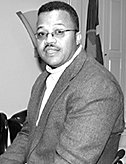This past Sunday, Michael Jerome Williams, a 28-year-old suspect in a double homicide, turned himself in to police after committing the city's eighth and ninth homicides in 10 days with the double murder of LaTonya Thompson and Calvin Jennings. The murders brought the city's homicide count for 2005 up to 40—22 of those since the beginning of July.
Prior to the Sunday murders, the city had suffered seven homicides in seven days, all with firearms. Three people were sprayed with automatic rifle fire on Nov. 10. Then a man was fatally shot on Williams Avenue. Four days later a man died of bullet wounds on Lilly Street. The next day, another man was shot and killed on Berwood Drive. Then, a motel clerk was killed during an armed robbery on day seven.
Mayor Frank Melton, who ran and won his campaign promising to cure the city's crime in 90 days, called for a citywide "lockdown," saying children should be inside by 10 p.m., and adults at home between midnight and 2 a.m.
Nick Barrack, assistant general manager of Left Field Sports Grill, says the "lockdown" did not lead to premature closing hours at his business over the weekend.
Melton put on a good show before television cameras last Friday, however, organizing a police sweep to search for Dexter Lipsey wanted for the Nov. 10 triple murders. Offering only a surly silence and a steely glare for reporters, Melton joined a police SWAT team and other officers as they loaded into police cars, an armored truck and a recreational vehicle turned mobile command center, and headed off into the dusk to find bad guys.
The posse did not track down Lipsey that night, though. A city resident flagged down a police officer to alert him to Lipsey's whereabouts the next day. Then police moved in for the arrest.
The Sunday shootings brought the 2005 homicide rate disturbingly close to that of 2004, even though the city's murder rate dropped 31 percent the first half of 2005 over 2004, from 26 to 18. Last year, there were 52 homicides in the capital city by Nov. 20. The recent rash of killings reduces the difference, to date, between 2004 and 2005 down to a 23-percent drop, with a difference of only five deaths.
Council President Marshand Crisler, who has worked in the Hinds County Sheriff's Department, said acts of violence usually rise during the holiday season, starting in mid-November. He said police can do little to curb crimes of passion and domestic disputes such as the Sunday killings.
"It's more than ambitious for people to say that the police can prevent these things," said Crisler, who lives down the street from the site of the most recent murders. "You can't predict it. The guy was obviously distraught. History shows that he really didn't have any criminal record, no weird signs of violence. He just snapped. The man and his girlfriend had 10 years together and three kids. She was in the house with another man and his three kids."
Jackson resident Joseph Langston, who has served in the Madison Police Department and the Hinds County Sheriff's Department, agreed that crime has a pattern of going up over the holidays. "Not only that," said Langston, "but you got people without houses or jobs. There's an air of desperation. Some people are in survival mode right now."
All the recent murders were committed with firearms. Although the previous mayoral administration complained that Mississippi state law makes it difficult to get guns off the city's streets, Melton said during his campaign that no more gun-control efforts are necessary in Jackson.
"We got all the laws on the book that we need right now. The only thing we need to do is follow our own state statutes," Melton said during the campaign.
However, officials with the Chicago Police Department complain that most of the guns used to commit crimes in Illinois are coming from two states, in particular, where it is much easier to purchase guns.
"[S]ixty to 70 percent of the guns bought in 2004 and recovered were coming from outside Illinois, and we've got statistics showing that the biggest suppliers of out-of-state guns are Indiana and Mississippi. … [A]ll you need is a pulse and the money to buy a handgun down South," said Sgt. John Kohles, of Chicago's Cage Unit, which deals exclusively with tracking weapons linked to crime.


